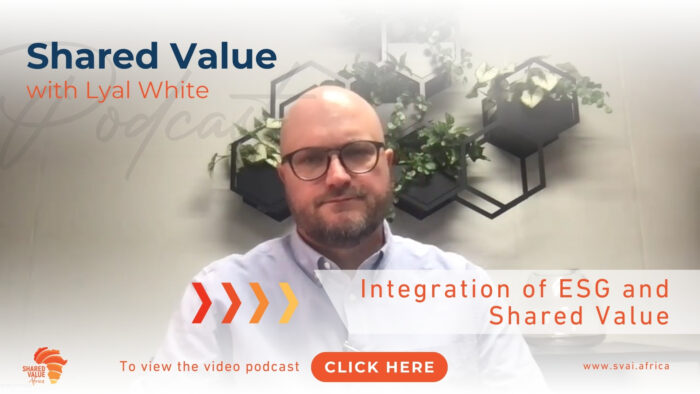Shared Value: The foundation of credible ESG reporting
Many people view ESG—Environmental, Social, and Governance—as both the starting point and the ultimate goal for responsible business practices. However, I’d like to challenge that perspective and suggest that ESG is a powerful reporting mechanism, but it is not the endgame. The true foundation for impactful ESG reporting lies in the concept of Shared Value.
What is Shared Value?
Shared Value, a business management concept developed by Harvard professors Michael Porter and Mark Kramer, focuses on creating economic value in a way that also produces value for society and the environment. It’s about identifying and addressing societal needs and challenges through core business strategies. By doing so, companies not only enhance their profitability and competitiveness, but they also contribute to societal and economic progress.
What is ESG?
ESG metrics are crucial for measuring a company’s impact on the environment, society, and its governance practices. However, these metrics are only meaningful if there is substantial value being created in the first place. Without the creation of Shared Value, ESG reports risk becoming empty checklists—fulfilling the letter of the law without embracing its spirit.
Shared Value as the Precursor to ESG
ESG is indispensable for transparency and accountability. It ensures that companies disclose their impacts and practices, allowing stakeholders to make informed decisions. But ESG should not be seen as the be-all and end-all. It’s a means to an end—a way to communicate the real, tangible impacts that businesses are making through their commitment to creating Shared Value.
Here’s where I want to be a bit controversial: focusing solely on ESG without a foundation of creating Shared Value is like putting the cart before the horse. If businesses are not actively working to create Shared Value, what meaningful information will they have to report? ESG, in isolation, can become a superficial exercise—a way to tick boxes rather than drive real change.
Shared Value on the African Continent and the Importance of Social Capital
Let us remind ourselves again about Porter and Kramer’s definition of creating Shared Value : It is about developing policies and practices to enhance the competitiveness of a company while simultaneously advancing the social , environmental and economic conditions of the communities in which the company operates.
Building social capital is a key component of creating shared value, as it enhances community engagement and fosters sustainable, mutually beneficial relationships and it contributes significantly to the development of social capital. Creating Shared Value (CSV) enhances social capital, serving as a moral compass for businesses. Here are some examples of how CSV can help to build social capital
- Creating Shared Value can Strengthening Community Engagement as CSV initiatives involve close interaction with local communities, leading to more effective solutions, building trust, and fostering long-term relationships. For example, Unilever actively engages communities in their supply chain to improve farming practices and support small-scale farmers.
- Collaborative Partnerships – CSV encourages forming partnerships with governments, NGOs, and other businesses, enhancing the collective ability to address social issues. Microsoft partners with nonprofit organisations, governments, and other businesses to leverage technology in solving global challenges.
- Employee Engagement and Inclusion – Companies that consciously implementing CSV strategies focus on fair wages, good working conditions, and opportunities for professional development, increasing employee satisfaction and loyalty. Salesforce is known for its culture of inclusivity and equality.
- Economic Development and Capacity Building – By focusing on education, health, and economic empowerment, businesses contribute to the development of human and economic capital within communities. Intel invests in education through its Intel Education initiative, improving outcomes and opportunities in underserved communities.
- Transparency and Accountability – CSV practices encourage transparency and accountability to the communities impacted. This transparency builds trust and sustains social capital. Companies like Accenture emphasise governance and ethical business practices, operating with high transparency.
- Governance and Ethics – Strong governance and ethics are fundamental to building trust and ensuring sustainable success. Accenture’s commitment to ethical standards across its global operations has earned it recognition on several ethical company lists.
- Long-Term Commitment – Unlike short-term CSR initiatives, CSV focuses on sustainable growth that benefits both the company and society, building enduring trust and commitment among stakeholders. By integrating social, environmental and economic growth, creating shared value provides a framework for businesses to contribute positively to the social structures of the communities they operate in, thereby building and sustaining social capital.
I’m always deeply grateful for the blessings in my life, and one of those is the opportunity to share and shift leadership mindsets and demonstrate how important creating Shared Value is for the prosperity of the African continent. My purpose with Shared Value Africa is to consciously motivate and lobby for the private sector to make a difference in the lives of all its stakeholders.
The essence of Shared Value is to enhance a company’s competitiveness while improving the economic and social conditions of the communities it serves. For me, it is a no-brainer. It is about stakeholder capitalism and not shareholder capitalism.
I believe Africa is where we are building the global future. We have our youth, while other major economies are struggling with aging populations. We must ensure that we support them to build a more sustainable future and create value for all.
In conclusion, ESG is a vital tool for transparency and accountability, but it must be built on a strong foundation of creating value and prosperity for all. By embracing the creation of Shared Value, businesses can ensure that their ESG reports are not just a collection of metrics, but a true testament to their commitment to making a difference.



